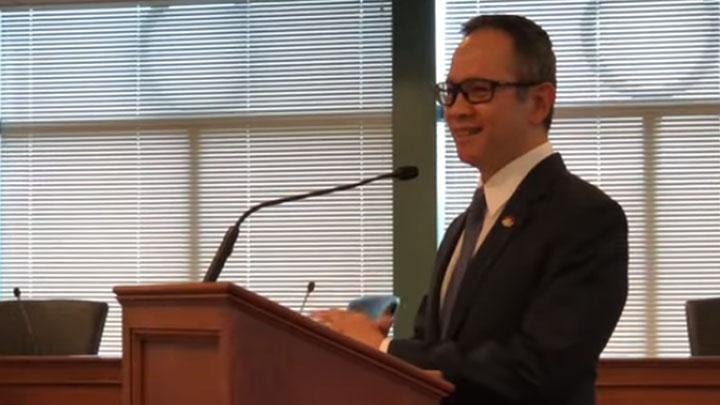Strategic with Communication; Govt can Lead Voice during Pandemic
Translator
Editor
15 April 2020 06:06 WIB

By: Simon Sibarani
Indonesia and the rest of the world are facing an extraordinary time. Experts have been calling it the “Black Swan” event – an extreme situation that defies any predictability and currently sets a new normal to the society. The hit of COVID-19 is a make-or-break moment where the initial and continued response from the government will deeply impact the level of trust, reaction, and cooperation from its people.
Although Kantar G7 Citizen Impact Study (2020) says there are early signs that response efforts have had a positive impact on trust in government, other surveys also expose variances in trust in government from region to region. In Indonesia, by general observation, most people think the government is not doing enough. This is why being strategic with communication during the pandemic becomes more important than ever.
Communication stands as the most important tool in managing a pandemic for it offers at least three urgencies. First, it prevents “infodemics”, a condition where there is an excessive amount of information about a problem that makes it more difficult to identify room for a solution. Second, it builds trust hence increase the probability that health advice and regulations will be followed by the people. Third, it ensures at-risk populations have the information they need to take well-informed actions for themselves, especially when healthcare capacity is limited. To these ends, there are actions required at each phase of the communication process.
First, knowing your constituents and what matters for them.
Being strategic with communication firstly requires conviction to a mantra: “the power of communication lies in our ability to listen first”. This is common-sense that is unfortunately often lost in executing the communication process.
The impact of the pandemic is deep and wide across various stakeholders – businesses are hitting the rock bottom, health workers are desperate for more support, employees are worried about their dependents, and vulnerable groups feel even more politically disengaged as they struggle to make sense of the crisis. These are situations where the government should be able to demonstrate its value proposition to the people, but it must start with having a clear “empathy map” of these constituents along with their interests, needs, and motivations.
Second, delivering messages that matter.
While there needs to be universal information that applies to everyone, the current government communication has not brought audience-specific messages that contain different touchpoints for different groups of audiences. Therefore, it is no surprise getting buy-in becomes harder because people think that the government is not operating in the same reality as they are.
Another fatal mistake is when the government assumes that citizens care and understand as much as they do. Take the example when President Joko Widodo firstly used the term “large-scale social restriction (PSBB)” without context before it was further managed by provincial governments, which immediately responded with public backlash. Delivering technical concepts without defining them, on top of the already poor public trust, contributes nothing but further damage to the crisis. The government must stay clear with the response being taken and communicate that with the guaranteed and describable outcomes, knowing that people are less willing to follow the instruction when the outcomes are unknown or not guaranteed.
When it comes to effective messaging, being informative is not enough. In a pandemic, there are a set of behaviors that people must perform and not, which affect both individual and people’s health. If people still do not think they will catch the virus, then the motivation to protect themselves is less effective. The government must work to look into the public’s belief and find an entry to move people towards the desired behavior. Best communication practices have offered several behavioral approaches, such as emphasizing disadvantages to discourage a behavior (loss aversion); combining small losses into larger loss; using moral psychology to help citizens make decisions based on what is right or wrong; or creating a new social identity to be adopted by the community, etc.
Third, meet your audience where they are.
The government must invest to use a variety of communication channels to distribute audience-specific messages and materials. How does the government ensure that information on policy and economic stimulants are known, understood and followed by businesses? How can the government transfer the information of medical supplies provision are heard and received by health workers who are waiting in worry? How should the government reach out to vulnerable groups living in slumps area with minimum hygiene facilities, so they can make sense of the world around them and take the necessary measures? Having the pubic know where they can obtain information is key because repeated exposure to the same messages can help change behavior.
Kantar’s G7 Citizen Impact Study (2020) says that TV news (32%) and healthcare providers (22%) were identified as the most reliable source of information about the COVID-19 outbreak across the G7, while Government & Politicians were viewed as most reliable by only 13%. However, Indonesian constituents can vary to some extent. As one of the countries with the most extensive health workers network in the world, the government can deploy midwives and nurses in rural areas as the trusted communicators to amplify central messages. This, of course, needs to come with improving the perceived quality of care provided by health facilities prior to the outbreak in order to minimize the danger of misinformation and to succeed in the interventions.
Fourth, monitor and change as needed.
In economics and policy-making, the government often fall into what commonly coined as “sunk-cost fallacy”, where they continue with certain action or behavior by regarding all resources that have spent while a correction is clearly needed. Communicating during pandemic must come with realizations that the process is interactive and fluid. If monitoring results prove that steps that are taken have yet to demonstrably improve the situation, then there should be iteration or revisiting the whole work process to make sure the right communication is developed. The government must look at how citizens’ trust and confidence in government have been impacted by the government response and identify whether there is a need to adapt tone, transparency, frequency orquality of citizen engagement to rebuild trust.
Lastly, the government must think and communicate what they do now in the context of the next quarters.
Looking ahead, the government must start formulating and communicating the possible responses plan across three phases of changes – prolonged infection phase, recovery phase, and the new normal. The timing of the pandemic is indeed unpredictable yet having a forward-looking response plan and communicating that effectively can build a sense of security, trust, and confidence among citizens towards their government. This is the time to put the government’s values to work and proactively lead the voice to show its capability to protect the lives of its people, far beyond political and economic interest. This is the defining moment that will set the answer soon when people ask: “Is the government doing enough?”
*)
Simon Sibarani is a communication specialist based in Jakarta, focusing on public affairs and social development issues. He currently advises development agencies, international and government institutions and corporations that aim to refine their communications.
DISCLAIMER
Articles published in the “Your Views & Stories” section of en.tempo.co website are personal opinions written by third parties, and cannot be related or attributed to en.tempo.co’s official stance























